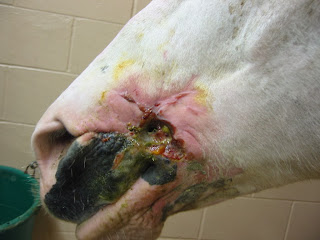The images below are from 3 different horses with the same disease. Squamous cell carcinoma is a type of cancer that tends to affect the lightly pigmented areas of horses. These areas include the penis (Figures 3-4), sheath (Figures 1-2), muzzle (Figures 5), anus, and the eye lids. Diagnosis should be confirmed via a biopsy and histopathology. This type of cancer does not commonly metastasize to other regions of the body but is locally aggressive.
As such, early intervention is the most important component to effectively treating this cancer.
 |
| Figure 1 |
 |
| Figure 2 |
Once the diagnosis of squamous cell carcinoma (SCC) has been confirmed it is my opinion that surgical resection of the tumor should be attempted. This is easier said than done and in some cases surgical removal is not a reasonable option. In some cases, if the lesion is small yet not surgical, cryotherapy with liquid nitrogen can be highly effective. Cryotherapy is recommended for carcinomas near the muzzle and on the penis. Once the tumor has been removed or if it is not surgical, I recommend proceeding with intra-lesional chemotherapy agents to attack any remaining cancerous cells. It is common to repeat the intra-lesional chemotherapy treatment multiple times.
 |
| Figure 3 |
 |
| Figure 4 |
It is very important to aggressively treat SCC! The horse in Figure 5 was treated with only surgical resection. Within months of surgery, the tumor returned and invaded the oral cavity. There were no more options for this horse. Horses with SCC need to be treated early and repeatedly until there is no evidence of any remaining cancerous tissue!!
 |
| Figure 5 |












